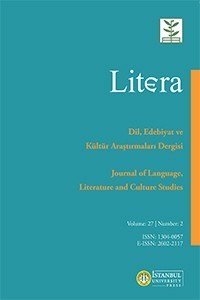Poetic Reality in Primer exilio by Ernestina de Champourcín, an Exiled Female Poet of the Generation of ‘27
Poetic Reality in Primer exilio by Ernestina de Champourcín, an Exiled Female Poet of the Generation of ‘27
This paper investigates the poetic reality in Primer exilio by Ernestina de Champourcín, an understudied and forgotten female poet of the Generation of ‘27, also known as the Silver Period in 20th Century Spanish Poetry. Most of the 1927 Generation poets were exiled to Europe or Latin America during the Spanish Civil War or in its aftermath, and they were only able to return to Spain after the death of General Franco. Upon their return, they had difficulty in adjusting to their homeland. The female poets shared the journey of their male counterparts in their social struggle and experienced the same tragedies. Although their intellectual and artistic identities were known, these female poets, among whom were important thinkers, artists, writers, and translators, did not receive the due attention they deserved as their works were not included in the poetry anthologies of the period and were disregarded by literary critics, which delayed their rightful recognition and acknowledgement in Spanish literary history. By considering the social and cultural climate of its era, this paper explores the poetic realism in Primer exilio by Ernestina de Champourcín, who was born in Vitoria in 1905. After a discussion of the historical, social, and cultural circumstances of the period in which the poet lived, which was a critical moment in Spanish history, her poetic inclinations and the influences on her poetica are evaluated and the poetic realism created in her work Primer exilio is exemplified by poems translated from Spanish into Turkish. As a topic that has only very recently received attention, this paper references articles by Spanish poetry scholars and critics as well as the poet’s own thoughts and poetry
Keywords:
Ernestina Champourcin, 'Primer exilio', poetic reality, women's literature Spanish literature,
___
- Arizmendi, Milagros. (2004). Poemas de exilio, de soledad y de oración, Madrid: Ediciones Encuentro. google scholar
- Balló Colell, Tania. (2016). Las Sin Sombrero. Sin ellas, la historia no está completa, Madrid:Espasa-Calpe. google scholar
- Checa, Edith. (1998). Entrevista. Ernestina de Champourcín olvidada entre los equívocos linderos de la Generación del 27, Espéculo, 9. Erişim adresi: http://webs.ucm.es (26.04.2021). google scholar
- Díaz Pardo, Felipe (2018). Breve historia de la Generación del 27, Madrid: Nowtilus. google scholar
- Fuente, Inmaculada de la. (2002). Mujeres de la Postguerra: De Carmen Laforet a Rosa Chacel: historia de una generación, Barcelona: Planeta. google scholar
- García Mendoza, Sara Isabel. (2006). Los exilios de Ernestina de Champourcín, Sancho el Sabio: Revista de Cultura e Investigación Vasca, 25, pp. 181-202. DOI: 10.22363/2313-2299-2021-12-4-969-980. google scholar
- González Allende, Iker (2004). El exilio como viaje y destino final en la poesía de evocación y de deseo de Ernestina de Champourcín, Sancho el Sabio: Revista de Cultura e Investigación Vasca, 20, pp. 147-169. google scholar
- Goméz Sobrino, Isabel. (2017). La correspondencia epistolar y poesía de Ernestina de Champourcín y Carmen Conde: Una habitación propia como taller de autencidad estética, Castilla. Estudios De Literatura, Universidad de Valladolid Revistas, 8, pp. 436-458. DOI: https://doi.org/10.24197/cel.8.2017.436-458. google scholar
- Lázaro, Fernando and Vicente Tusón (1981). Literatura Española, Madrid: Anaya. google scholar
- Machado, Antonio (1989). Poesía y Prosa, Madrid: Espasa- Calpe. google scholar
- Martínez Calvo, María Celeste (2015). Negación e identidad en Presencia a oscuras, de Ernestina de Champourcín, Álabe, 12, 1-13. DOI: http://dx.doi.org/10.15645/Alabe2015.12.2. google scholar
- Narbona, Rafael (2019). Ernestina de Champourcín, La voz transfigurada (I), El Cultural, 14. Erişim adresi: https:// elcultural.com (26.04.2021). google scholar
- Saz, Sara María (2018). La recuperación de la memoria histórica. Las mujeres olvidadas de la generación del 27, Cervantes, 301-316. Erişim adresi: https://cuc.cervantes.es (20.06.2021). google scholar
- Walliser Martín, Marta (2007). La influencia de la experiencia international en la labor educativa de María de Maeztu, Centro Virtual Cervantes, İnstituto Cervantes, Málaga, pp. 415-427, Erişim adresi: https://cuc. cervantes.es (20.04.2021). google scholar
- Başlangıç: 1954
- Yayıncı: İstanbul Üniversitesi
Sayıdaki Diğer Makaleler
Commensality and Togetherness in Becky Chambers’ The Long Way to a Small, Angry Planet
Kazuo Ishiguro’s The Unconsoled:An Interdisciplinary Analysis
Aiding and Abetting Survival: Americanizing Robinson Crusoe through Adaptation
“Paracelsus’un Gülü” Öyküsünün İmgelem Kuramı Açısından Yorumlanması
Tracing the Image of Turks in Travel Writing through Translation
Analysis of the Mythical Discourse of “La esfinge de oro” by Carlos Raúl Sepúlveda
